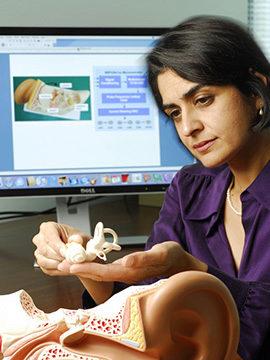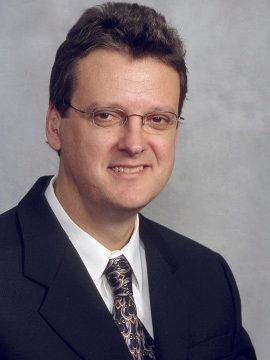With a focus on hearing, this month's spotlights focus on ECE professor Pamela Bhatti whose research focus is cochlear implants, and ISyE professor Renato Monteiro who has been wearing hearing aids since he was nine years old.

Pamela Bhatti
Associate Professor
School of Electrical and Computer Engineering
How long have you been at Georgia Tech, where did you come from, and what do you enjoy about working here?
I've been at Tech for eight years and I came from the University of Michigan where I did my PhD. Before that I worked in industry. It's a very vibrant environment. People here are very eager to do research and teach, and there's a great infrastructure to support people who want to do both. In my field we have a great collaborative relationship with Emory, and I do a lot of biomedical research, so that's very inviting. There's always something new or something cutting edge to be involved in, and the students are a lot of fun.
What is the focus of your research?
We focus on cochlear implants which is the most invasive intervention for hearing loss. Over the course of time we all lose some form of our hearing, and this is a therapeutic option for people who have profound sensory neural hearing loss. What it means is that the neural pathway from the outer ear to the brain is intact but the mechanism for translating the sound from neural impulses into sound or electricity is broken. We can come in and electrically stimulate auditory nerves and people can perceive sound. We don't do that per se in my lab, but we build technologies that eventually may be used for that.
So we have the research piece and a great platform for education and teaching people about biology and engineering- particularly signal processing.
What are some of the causes of hearing loss that people should be aware of?
There's a big campaign going on through the NIH to minimize hearing loss. If you work in an environment where you're constantly bombarded by noise then over time your body will just get tired. Your hearing is dependent on sensors made of cells, and they get fatigued. Protecting your hearing from loud noises is important. Wear ear plugs if that's the type of environment you work in. Loud music can certainly damage hearing. A good diet also helps. Ringing in you rears can be caused by caffeine or even by chocolate. It's all a balance. The healthier your body is the better your odds are of having healthy hearing.
A lot of people wear ear buds for extended periods, especially in open office environments. It's nice that people around them don't have to hear what they're listening to, but there are recommendations for using them- most in ear devices should only be worn for a couple of hours a day total.
Another important point is that we often don't realize how much noise children are exposed to. A study was done in Canada that looked at the sound levels in daycare settings. They found that if children are exposed to a lot of extraneous sound their language development will be dampened. It's important to be mindful of that if you have children in a daycare setting. Older adults can discriminate between sounds but for children still developing it can be problematic.
For those who do suffer from hearing loss, how much has technology changed over the last few decades?
I work on the intervention side, but the first thing you do with a person with hearing loss is try hearing aids because they just sit inside the ear canal. They're non-invasive, so you don't have to open up any skin to get in there. Hearing aid technology has changed dramatically. They've become much more clever in signal processing, and all of the scaling that goes on in the electronics industry for our handheld devices gets leveraged for medical technology. If something gets smaller we get the benefits in the form of smaller devices. Some hearing aids are so small you can hardly tell they are there. There's still room for improvement though, because a hearing aid makes assumptions about your environment. You have to capture the sound and then decide what to do with it. We're often in very dynamic environments. Talking in an office is much easier than if you were in Starbucks, and a hearing aid needs to adapt to those different environments.
A lot of the changes are being driven by user requests, and what's exciting is that those features are approachable problems for undergraduate students. You don't necessarily have to be a PhD researcher to make an impact in technology for medical applications. That makes it a very exciting environment. The more we do the more we see that there's space for everyone to contribute, not just doctors or scientists.
Have there been any major breakthroughs recently in hearing aid or cochlear implant research?
Some of the most major breakthroughs have been finding out that hearing loss is a function of frequency. Loss happens at the higher frequencies first, and we're finding that the high end can be addressed with a cochlear implant while a hearing aid can address the lower frequencies, and they can work together. We're finding ways to trick the auditory system through signal processing to extract speech and music from what a hearing aid or implant provides. We're also combining two implants, one on each side, which really engages the brain.
Renato Monteiro
Professor
H. Milton Stewart School of Industrial & Systems Engineering
How long have you been working at Georgia Tech and where did you come here from?
I've been at Tech since 1993. I'm originally from Brazil. I came to do my PhD at Berkeley, then I went to a few other places- I was in New Jersey at the AT&T Bell Labs and then three years at the University of Arizona before I came to Tech as an assistant professor.
What do you enjoy about working at Georgia Tech?
I like the city. Being in a big city is a plus compared to many other schools. Georgia Tech is a great school, and ISyE is number one in its field. That's a positive factor for sure. You can't stay this long in one place if you don't like it. I definitely like it.
What type of hearing difficulties do you have?
I have hearing loss on high frequencies. I've had it since I was young. My elementary school teacher observed that when we were doing dictation that when she was close to me I did better and when she was farther away I did worse. It was brought to my mother's attention, so we got my hearing tested. It was very interesting that a teacher noticed something my mother did not.
Since that time I've been wearing hearing aids. I don't wear them all the time. At home I remove them. I put them in if I'm in public, watching TV, or at a faculty meeting. They have gotten more and more comfortable, so wearing them is easier than it used to be. I have about 50% hearing loss, mostly on high frequencies.
How much has hearing aid technology changed since you began wearing them?
The technology has improved a lot. I can control my hearing aid now with my smartphone. There isn't even a volume control on the device- it's all through the phone. The technology is incredible, but maybe inconvenient since it forces you to have your phone all the time. But it also has Bluetooth. That's a big change. Old hearing aids made you put your phone behind your ear, but then the mouthpiece was too far away, so you had to move your phone a lot. Now the sound goes directly into your ear via Bluetooth.
Have you seen a bigger change in the last few years or is the rate of change fairly steady?
When I change hearing aids about every five years I don't usually see a big improvement, but sounds have gotten clearer. There hasn't been a revolution in technology, but a lot of gradual improvements. Bluetooth has been a big step up though. It's been around for a while, but as far as I know it's new to hearing aids. I just got this model, and it's higher end than my old one. I wanted something nice. They can be expensive, and they keep getting smaller and smaller. Now they're so small the controls are in your phone, so the size went from the hearing aid to your iPhone, which keeps getting bigger and bigger.
What are some of the biggest challenges to being hearing impaired?
Not hearing well makes many things in life more difficult. In meetings it's very hard to follow the conversations because they come from multiple directions. People who have hearing trouble tend to look at people so they can do some lip reading. In a faculty meeting you don't have a chance to do that, so I miss a lot of what is being said.
I also can't go to movies. Even if they're in Portuguese, my first language, I can't understand. The sound isn't good. TV is easier to understand, especially dramas, like soap operas. They focus more on faces. But in movies there is too much sound from many different directions.
It definitely makes your life more challenging, but I don't think most people realize it. It's very frustrating to want to hear people but not be able to, and you have to live with it. I know I miss things. Eating in public is very hard- it's hard to have a conversation with so much background noise. Hearing aids have settings for different environments, and that helps, but they aren't perfect.
Another thing that is hard for people with some deafness is spelling. A 'T' can sound like a 'B'. If I'm talking on the phone I often ask them to spell words for me, and tell me a word that starts with each letter.
Hearing aids also have trouble separating the important noise from the background noise. For example, wind is a big problem. It causes a lot of noise, like on a microphone. High places are also terrible. If I'm in a stairwell I can't hear anything. High ceilings, for some reason, change the sound a lot. I don't know the physics behind that.
Is there anything that a hearing impairment makes easier?
There are some advantages to not hearing so good. If you're in a noisy place and you want it to be quiet, you just turn off the hearing aid. That's great on airplanes, to be able to hear less, or if you're trying to read in a noisy place.
What are some things people should keep in mind when interacting with people who are hearing impaired?
Hearing impaired people are often embarrassed to mention that they don't hear well, so sometimes they seem distracted, but they're just trying to hear. It's hard to admit. Also, if you have a meeting with a person that can't hear well, talk to them face to face. Make sure they can sit where they can see as many faces as possible. Fans can also be very distracting for people with hearing aids, like projector fans. If those can be turned off that can help.
Depending on the situation, captions help a lot in videos or presentations. Subtitles make TV and movies much better. I always watch movies at home with subtitles on. I'm always a second or two behind everyone else.
The biggest difficulty is socializing with a group of people. It's embarrassing to say "Can you speak louder, I don't hear very well." And even if they're trying, it's awkward to ask them to repeat themselves. You naturally get left behind in group settings, especially with new people. Being able to see someone's face is probably the biggest thing that helps.
So it's challenging, but that is how life is. I've been wearing my hearing aids a long time, so I am used to it.

